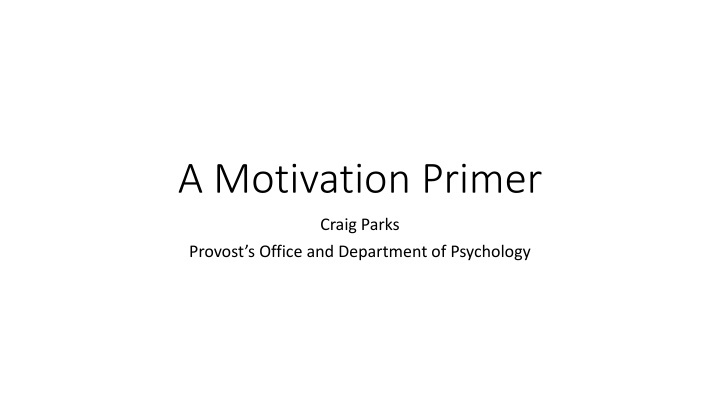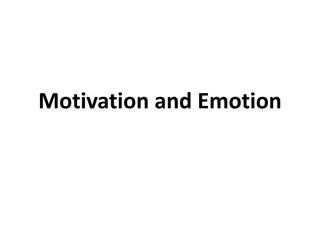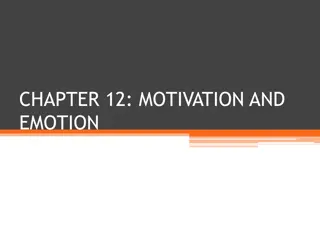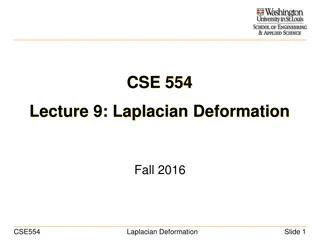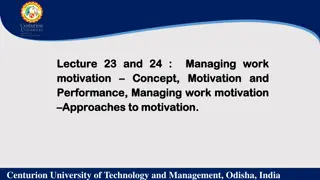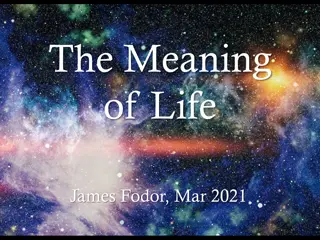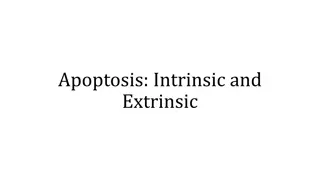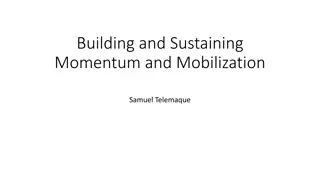Extrinsic and Intrinsic Motivators
Examine the driving forces behind human behavior, distinguishing between extrinsic motivators like money and intrinsic motivators such as morals and self-knowledge. Discover how different types of extrinsic motivators influence behavior and the importance of integrated and identified connections to sustained motivation.
Download Presentation

Please find below an Image/Link to download the presentation.
The content on the website is provided AS IS for your information and personal use only. It may not be sold, licensed, or shared on other websites without obtaining consent from the author.If you encounter any issues during the download, it is possible that the publisher has removed the file from their server.
You are allowed to download the files provided on this website for personal or commercial use, subject to the condition that they are used lawfully. All files are the property of their respective owners.
The content on the website is provided AS IS for your information and personal use only. It may not be sold, licensed, or shared on other websites without obtaining consent from the author.
E N D
Presentation Transcript
A Motivation Primer Craig Parks Provost s Office and Department of Psychology
What motivates people to do what they do? Extrinsic motivators are things that we do not possess but would like to have. Behave in order to get them Money, recognition, possessions Intrinsic motivators are personal factors that induce particular behaviors in us Morals, enjoyment, self-knowledge Neither is bad or good. All of us are influenced by both types
Extrinsic motivators Taylorism: Early 20thcentury: Workers are like parts in a machine Bolts don t want to work. Neither do humans Must induce work via incentive When a bolt breaks, you replace it. When a worker breaks, replace him/her Most jobs in developed nations are based, at least in part, on Taylorism Employee assistance programs remove the broken worker aspect
Types of extrinsic motivators: External: Behavioral contingencies Do your job and you will get a paycheck (reward) Drive the speed limit or you will get a ticket (negative motivator) Person perceives the behavior as beyond their control: I have to do this Introjected: Avoidance of negative feelings If I don t go to the family reunion, my mother will make me feel guilty I won t apologize because I don t want to admit that I was wrong Person feels pressured by emotions to do the behavior
Identified: Connection to valued, related outcome I practice my scales because I want to be a good guitarist I eat a low-carb diet to maintain my weight Person sees the behavior as necessary to achieve a larger goal Integrated: Connection to valued, unrelated outcome I help pick up litter because I want to be a good citizen I volunteer in a classroom so that I m not just sitting at home all day Person sees the behavior as one way to achieve a larger goal
The challenge with extrinsic motivators: Behavior ends when they are taken away You will no longer get a ticket for excessive speed Your mother does not care if you go to the reunion or not Research indicates that carbohydrates do not affect your weight The local disposal company begins doing litter pickup Thus extrinsic motivators, once applied, must always remain in place However, this is less of an issue if the behavior can be Identified or Integrated with a larger goal that the person values
Intrinsic motivators Behavior is self-determined; I do it because I want to I enjoy it I am interested in it It is a core part of my values Self-knowledge/improvement is important to me I get satisfaction from doing it Intrinsically motivated behaviors will usually persist for a long time (though not necessarily forever)
What makes an activity intrinsically interesting? And, why do some people find an activity interesting yet others do not? All humans have needs to feel competent, autonomous, related to others Intrinsically interesting activities are those that help fulfill one or more of these needs
Feelings of competence are promoted through Setting of optimal goals Feedback that the person is performing effectively Absence of demeaning evaluation Goal-setting: Difficult to get right Optimal goals are Moderate-to-low probability of attainment Specific on all relevant dimensions Doable given the person s abilities and resources Do your best : No no no no. Awful goal !
Autonomy Person feels that they are engaging in the behavior because they want to The presence of extrinsic motivators can make performance of the behavior decrease I will pay you to do your hobby Incentives, threats, deadlines, competition all decrease intrinsic motivation Micro-management will kill intrinsic motivation (and task mastery) Promote autonomy through self-direction Provide goal, get out of the way
Important note: There can be large differences in desire for self- knowledge/self-improvement Some people prefer to master one specific skill set and apply it Prefer jobs with low variety, high routine, high specificity Some people prefer to continually add to their skill set and seek constant challenge Prefer jobs with high variety, low routine, low specificity
For some people, maximal performance might involve doing the same thing every day for 40 years, with no mistakes For others, repetition kills motivation I already know that I can/cannot do this task. Why would I do it again? Thus, learn your employee s intrinsic style before trying to motivate them
Takeaways Extrinsic motivation is not a bad thing. We do it all the time But, once applied, extrinsic motivators have to remain in place, unless task becomes intrinsically interesting Intrinsic motivation encourages persistence and striving, maximal performance But it s easy to kill intrinsic motivation. Be careful
